June 17, 2025 | 23:27 GMT +7
June 17, 2025 | 23:27 GMT +7
Hotline: 0913.378.918
June 17, 2025 | 23:27 GMT +7
Hotline: 0913.378.918
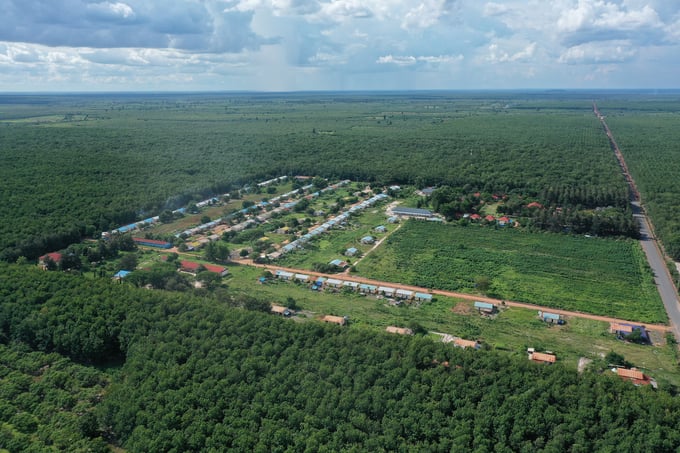
The headquarters and residential area of Tan Bien Kampong Thom Rubber in Santuk District. Photo: Tung Dinh.
The three rubber companies Tan Bien Kampong Thom, Phuoc Hoa Kampong Thom and Ba Ria Kampong Thom form an equilateral triangle in Santuk District, Kampong Thom Province, with each headquarters approximately 10 km apart.
Although they were permitted and implemented nearly simultaneously, Tan Bien Kampong Thom is the first company to bring rubber from the Vietnam Rubber Group (VRG) to be planted in Cambodia.
After nearly 20 years in Cambodia, Tan Bien Kampong Thom Rubber has now developed a stable presence, both in terms of plantation and workforce. The company's productivity consistently ranks among the top of the 16 VRG units in Cambodia and it is a member of the 2-ton/ha club.
Meanwhile, the average income of workers is 380 USD/person/month, higher than the average in Cambodia, which is 300 USD/person/month. The standard of living for both the workers and the surrounding community has improved, transforming the region.
Achieving the results seen today has required the collective effort of Tan Bien Kampong Thom Rubber to overcome many challenges from the early days, as they were among the pioneers.
The most challenging period was from 2007 to 2014, when infrastructure was nonexistent, and the vast, desolate land showed no signs of human touch. Mr. Lam Thanh Phu, the company's General Director, shared: "Back then, there were no roads. To survey the land, we had to travel 40 km every day by a plow and ox carts and just the travel time alone took more than half a day".
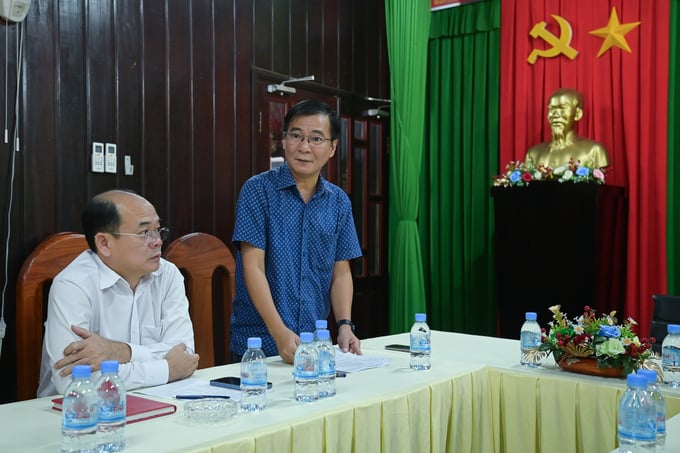
Mr. Lam Thanh Phu, the General Director of the company (standing), shares insights about the development journey spanning over 17 years in Cambodia. Photo: Tung Dinh.
At that time, the location of the company's headquarters was still desolate, remote and lacked electricity. The team had to encourage each other to overcome the hardships and remain committed to developing the rubber trees.
In addition to challenges related to living conditions and infrastructure, the company also struggled financially during the first seven years. The reason is that it was still in the development and investment phase, not yet engaged in production and sales. The financial situation only began to improve with the start of operations, from 2014-2015 onward.
However, the greatest challenge was still the recruitment, training and retention of Cambodian workers, with 100% of the direct labor force being local.
Language barriers, difficulties in accessing technical knowledge and differences in habits and customs created significant obstacles, but in the end, Tan Bien Kampong Thom Rubber successfully overcame these challenges.
"Challenges must be tackled gradually. We recruited gradually, made contact gradually, and provided guidance gradually. We approached the workers with sincerity and empathy to ensure mutual understanding", Mr. Lam Thanh Phu added.
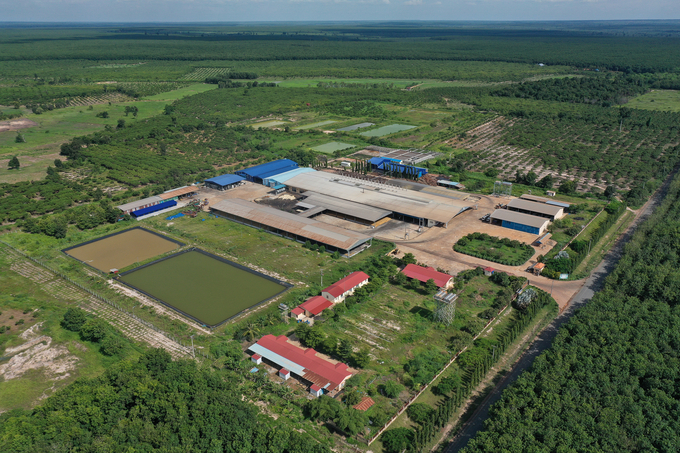
The view of the latex processing factory of Tan Bien Kampong Thom Rubber. Photo: Tung Dinh.
According to General Director Phu, the company is committed to economic development while also focusing on improving living standards, social welfare, cooperation and friendship, adhering to the principle of "Good neighborliness, traditional friendship, comprehensive cooperation and long-term sustainability".
At this point, after 17 years, the rubber development project in Cambodia by the company has made a tangible contribution to the friendly relations between Vietnam and Cambodia.
For example, a desolate and remote area has been transformed into a bustling community with houses and shops. Since Tan Bien Kampong Thom Rubber established in Santuk District, two new Cambodian villages have emerged in the surrounding area.
The initial wooden houses for workers have now been upgraded to solid structures, with a total of 526 housing units fully occupied. Additionally, infrastructure such as schools, hospitals, health stations, wells and a temple have been built and invested in to support the workers' living conditions.
Additionally, the company actively participates in charitable activities and contributes to social welfare in Cambodia. This includes supporting the Red Cross, building schools, constructing roads to facilitate the local community's mobility and livelihood and organizing visits to workers and local residents during Cambodian festivals and traditional events.
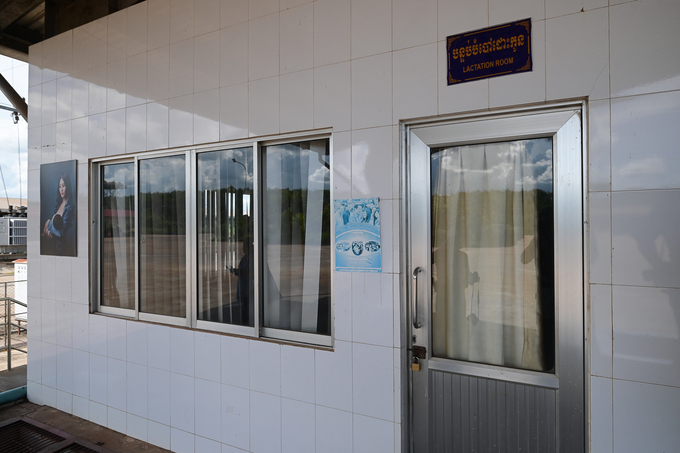
The company has set up a room for breastfeeding mothers at the factory. Photo: Tung Dinh.
Maintaining the operation of a party branch within the company, Mr. Lam Thanh Phu mentioned that, in addition to their economic development duties, the party members in the unit also play a role in strengthening and enhancing the relationship between the two countries.
After 17 years, the contributions of Tan Bien Kampong Thom Rubber in the region have been recognized by the local workforce, residents and local authorities.
While the authorities share and cooperate, the workers and local residents are very supportive and cooperative. This is the result of continuous efforts in communication and exchange by the company's leadership over time, along with ongoing efforts in educating and training the workforce.
Former international student at Vietnam National University of Agriculture
Born in 1980, Savan Din is a former Cambodian international student at the Vietnam National University of Agriculture. After completing his undergraduate studies, he stayed on to finish his master's thesis.
Joining the company as a translator in 2007, this affable young man has now risen to the position of Deputy Director, responsible for external affairs.
"When I first returned to Cambodia, I hadn't planned on working in rubber. However, after being introduced by relatives, I came to try out as a translator and have been with Tan Bien Kampong Thom ever since", the Cambodian Deputy Director shared in fluent Vietnamese.
When asked why he chose to work in such a remote location with rubber, despite having a degree that could offer many opportunities in a large city, Savan Din said: "In the early days, it was indeed challenging and there were times when I considered leaving. But after working together, I developed a bond and connection, so I decided to stay and continue with the team".
Tan Bien Kampong Thom Rubber
The company currently employs 1.696 workers, including 98 Vietnamese and 1.598 Cambodians. The area of rubber plantations managed by Tan Bien Kampong Thom Rubber Development Co., Ltd. is 7.243,91 hectares and has been operating steadily since 2014.
In 2023, the company's production reached over 15.300 tons, exceeding the planned target by more than 7%, which translates to a yield of 2.11 tons/ha and a labor productivity of 12.32 tons/person/year.
This performance enables the company to contribute more than 2.4 million USD to the state budget in 2023, while still ensuring an average income of over 396 USD/employee/month.
Translated by Phuong Linh
![Turning wind and rain into action: [7] Early disaster warnings help marine farmers minimize losses](https://t.ex-cdn.com/nongnghiepmoitruong.vn/608w/files/news/2025/06/17/z6704423696987_15fd32ffc26d590d204d520c9dac6786-nongnghiep-142942.jpg)
(VAN) In recent years, thanks to early disaster warnings and forecasting, marine farmers in Khanh Hoa province have been able to reduce risks and losses, thereby improving production efficiency.
![Turning wind and rain into action: [6] ‘Four on-the-spot’ disaster management software](https://t.ex-cdn.com/nongnghiepmoitruong.vn/608w/files/news/2025/06/17/e5a48259d6a262fc3bb3-nongnghiep-183800.jpg)
(VAN) By simply activating the scenario on the disaster management software, the relevant authorities immediately know how many households need to be evacuated, where to evacuate them to, and by what means of transportation…
![Turning wind and rain into action: [5] Hue applies modern technology in disaster forecasting](https://t.ex-cdn.com/nongnghiepmoitruong.vn/608w/files/news/2025/06/17/z6704423696987_15fd32ffc26d590d204d520c9dac6786-nongnghiep-093938.jpg)
(VAN) In Hue city, modern technology has recently been applied in meteorological and hydrological forecasting and warning, helping to reduce the damage caused by natural disasters.

(VAN) A cutting-edge farming technique being implemented on an experimental ranch in Arizona's Sonoran Desert has already saved a billion gallons of water over five years, according to Civil Eats.

(VAN) Poultry and pig production and the environment can be boosted through enhanced water technology, according to new research.
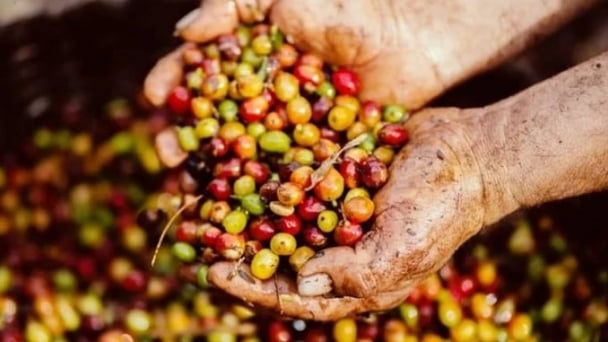
(VAN) Coffee prices on June 16, 2025 are unchanged. In Vietnam, local trading prices are holding steady, ranging around VND 112,000 – VND 112,500/kg.
![Turning wind and rain into action: [4] Bringing climate bulletins to remote and isolated areas](https://t.ex-cdn.com/nongnghiepmoitruong.vn/608w/files/linhnhp/2025/06/14/1152-z6704423696987_15fd32ffc26d590d204d520c9dac6786-nongnghiep-151141.jpg)
(VAN) The Vietnam Agriculture and Nature Newspaper interviewed Mr. Vu Thai Truong, Acting Head of Climate Change and Environment at UNDP Vietnam, to gain deeper insight into how climate bulletins are delivered to farmers.